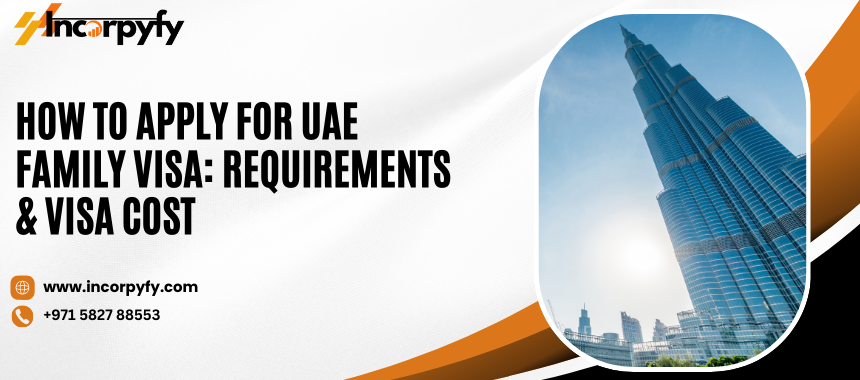
The United Arab Emirates (UAE) is a melting pot of diverse cultures, attracting expatriates from around the world seeking employment and business opportunities; for those who wish to bring their families along, obtaining a UAE family visa is essential. This comprehensive guide will walk you through applying for a UAE family visa, covering the requirements, costs, and other crucial details to ensure a smooth and successful application.
Understanding UAE Family Visa Categories
The UAE offers several family visa categories to cater to the needs of expatriates living and working in the country. These categories include:
- Spouse Visa: This visa allows the spouse of a UAE resident to live and work in the UAE.
- Child Visa: This visa permits the children (up to 18 years old for males and 18 or until marriage for females) of a UAE resident to reside in the country.
- Parent Visa: This visa enables UAE residents to sponsor their parents so they can live with them in the UAE.
- Domestic Worker Visa: This visa allows UAE residents to sponsor domestic workers, such as nannies, housekeepers, or caregivers, to work in their households.
Read More: Business Setup Consultants in UAE
Eligibility Criteria for UAE Family Visa
To be eligible for a UAE family visa, the sponsor (the UAE resident) must meet certain criteria. These requirements may vary slightly depending on the emirate and the specific visa category, but generally include:
- Minimum Salary Requirement: The sponsor must earn a minimum monthly salary, which varies based on the visa category and the number of dependents being sponsored. For instance, the minimum salary requirement to sponsor a spouse is typically higher than when sponsoring children or parents.
- Valid Residence Visa: The sponsor must hold a valid UAE residence visa, such as an employment visa, investor visa, or partner visa.
- Accommodation: The sponsor must provide proof of appropriate accommodation, such as a tenancy contract or property ownership documents, to ensure the sponsored family members have a suitable place to live.
- Health Insurance: In most cases, the sponsor must provide comprehensive health insurance coverage for the sponsored family members.
Read More: Business Setup in Dubai
Required Documents for UAE Family Visa Application
To apply for a UAE family visa, you will need to submit a set of documents to the relevant immigration authorities. The exact list of documents may vary based on the emirate, visa category, and individual circumstances but generally includes:
- Completed Application Form: The sponsor must complete the appropriate visa application form, provide personal and employment details, and provide information about the family members being sponsored.
- Passport Copies: Clear copies of the passports of both the sponsor and the sponsored family members must be provided.
- Marriage Certificate: A copy of the marriage certificate (attested and translated if required) must be submitted for spouse visa applications.
- Birth Certificates: Copies of the children’s birth certificates (attested and translated if required) are necessary for child visa applications.
- Proof of Relationship: Documents proving the relationship between the sponsor and the parents, such as birth certificates or family books, are required for parent visa applications.
- Employment Documents: The sponsor must provide proof of employment, such as an employment contract, salary certificate, and labor approval from the Ministry of Human Resources and Emiratization (MOHRE).
- Tenancy Contract or Property Ownership Documents: Documents proving adequate accommodation for the sponsored family members must be provided.
- Health Insurance Documents: Proof of comprehensive health insurance coverage for the sponsored family members is typically required.
- Previous Visa Cancellation Papers (if applicable): If the sponsored family members previously held a UAE residence visa, their visa cancellation papers must be submitted.
UAE Family Visa Application Process
The process of applying for a UAE family visa typically involves the following steps:
- Gather Required Documents: Collect all the necessary documents per the requirements of the relevant immigration authority.
- Submit the Application: The sponsor must submit the completed application form and the required documents to the General Directorate of Residency and Foreigners Affairs (GDRFA) or the relevant free zone authority.
- Pay the Visa Fees: The sponsor will be required to pay the applicable visa fees, which vary based on the visa category and the emirate.
- Medical Examinations: The sponsored family members may need to undergo medical examinations, including blood tests and X-rays, at approved healthcare facilities in the UAE.
- Biometric Data Collection: The sponsored family members must provide biometric data, such as fingerprints and facial scans, as part of the visa application process.
- Entry Permit Issuance: If the application is approved, an entry permit will be issued, allowing the sponsored family members to travel to the UAE.
- Visa Stamping: Upon arrival in the UAE, the sponsored family members must have their visas stamped in their passports at the immigration counters.
- Medical and Emirates ID Registration: After entry, the sponsored family members must undergo additional medical tests and register for their Emirates IDs, which serve as national identification cards in the UAE.
Read More: Golden Visa Dubai, UAE
UAE Family Visa Costs
The cost of obtaining a UAE family visa can vary depending on the emirate, visa category, and the number of dependents sponsored. Generally, the fees may include:
- Entry Permit Fees: These fees are charged for issuing the entry permit and typically range from AED 100 to AED 500 per person.
- Visa Stamping Fees: Upon arrival in the UAE, visa stamping fees must be paid, ranging from AED 500 to AED 1,000 per person, depending on the visa category.
- Medical Examination Fees: The cost of mandatory medical examinations, including blood tests and X-rays, can range from AED 300 to AED 700 per person.
- Emirates ID Registration Fees: The fees for obtaining an Emirates ID, the national identification card, are typically around AED 100 to AED 300 per person.
- Establishment Card Fees: If the sponsor is self-employed or owns a business, they may need to obtain an establishment card, which can cost around AED 2,000 to AED 5,000.
- Value Added Tax (VAT): In the UAE, a 5% VAT is applied to most visa-related fees.
It’s important to note that these costs are subject to change. For the most up-to-date information and accurate cost estimates, it’s advisable to check with the relevant authorities or consult with professional service providers like Incorpyfy.
Processing Time for UAE Family Visa Applications
The processing time for UAE family visa applications can vary depending on several factors, such as the emirate, visa category, and the completeness of the submitted documents. Generally, the process can take a few weeks to several months. Some key factors that influence the processing time include:
- Workload at the Immigration Authorities: During peak seasons or periods of high demand, the processing time may be longer due to the increased workload at the immigration authorities.
- Completeness of Documentation: Applications with incomplete or incorrect documentation may face delays as additional information or corrections may be requested.
- Security Checks: Thorough background and security checks are conducted for all visa applications, which can contribute to longer processing times.
- Medical Examination Results: In some cases, additional medical tests or clarifications may be required, leading to extended processing times.
- Nationality and Country of Origin: Certain nationalities or countries of origin may require additional scrutiny or clearances, potentially prolonging the processing time.
To avoid delays and ensure a smooth application process, submitting a complete and accurate application with all the required documents is crucial. Working with professional service providers like Incorpyfy can also help streamline the process and provide guidance on the expected processing times based on individual circumstances.
Renewing and Canceling UAE Family Visas
Once a UAE family visa is obtained, it must be renewed periodically to ensure its validity. The renewal process typically involves submitting updated documents, such as employment contracts, salary certificates, tenancy agreements, and the applicable renewal fees.
In some cases, family members may need to cancel their UAE family visas, such as when the sponsor’s employment or residency status changes or when the family decides to leave the country permanently. The visa cancellation process requires submitting specific documents and paying cancellation fees to the relevant immigration authorities.
It’s important to keep track of the visa expiration dates and initiate the renewal or cancellation process well in advance to avoid any penalties or legal complications.
The Role of Professional Service Providers
Navigating the UAE family visa application process can be complex, especially for those unfamiliar with the local regulations and procedures. This is where professional service providers like Incorpyfy can be invaluable assets.
Professional service providers offer various services to assist with the UAE family visa application process, ensuring a hassle-free experience. Here are some key ways in which they can help:
- Guidance and Consultation: Experienced service providers like Incorpyfy can provide personalized guidance and consultation, ensuring you understand the specific requirements, documents needed, and the overall process for your particular visa category.
- Document Preparation and Submission: They can assist in preparing and compiling the required documents, ensuring accuracy and completeness, which can help minimize delays or rejections during the application process.
- Application Submission and Follow-up: Professional service providers can handle the entire application submission process on your behalf, liaising with the relevant immigration authorities and following up on the status of your application.
- Visa Renewal and Cancellation Services: In addition to initial visa applications, service providers like Incorpyfy can assist with visa renewals and cancellations, ensuring compliance with the latest regulations and streamlining the process.
- Value-added Services: Many professional service providers offer additional value-added services, such as assistance with Emirates ID registration, medical examinations, and even accommodation and travel arrangements for sponsored family members.
- Expertise and Experience: With extensive knowledge and experience in handling UAE family visa applications, professional service providers can navigate the process’s complexities and provide valuable insights to ensure a smooth and successful outcome.
By partnering with reputable professional service providers like Incorpyfy, you can benefit from their expertise, save time and effort, and increase the chances of a successful UAE family visa application.
Conclusion
Obtaining a UAE family visa is crucial for expatriates who wish to bring their loved ones to the UAE. With the right preparation, understanding of the requirements, and adherence to the application process, families can be reunited and enjoy the unique experiences and opportunities the UAE offers.
Remember, the key to a successful UAE family visa application lies in meticulous planning, gathering all the necessary documents, and seeking professional guidance when needed. By partnering with experienced service providers like Incorpyfy, you can confidently navigate the process’s complexities and ensure a smooth transition for your family to the UAE.
As the UAE continues to attract global talent and foster a diverse and inclusive society, the family visa program remains vital in supporting expatriate families’ well-being and stability. By following the guidelines outlined in this comprehensive guide, you can make the dream of living and working in the UAE a reality for you and your loved ones.





